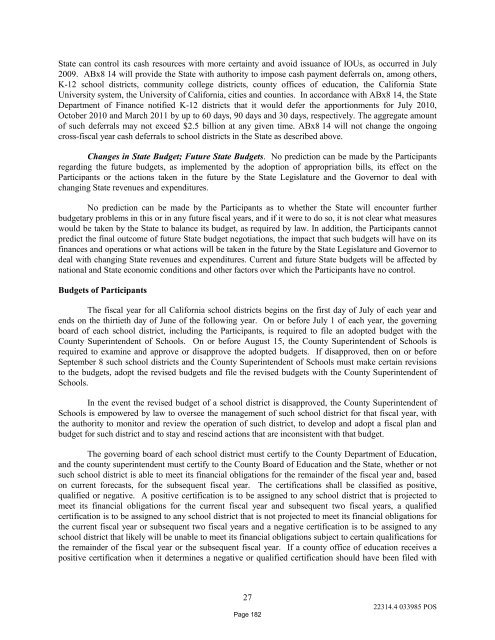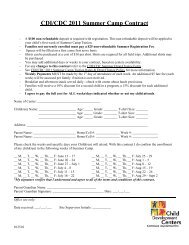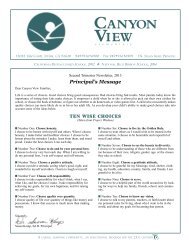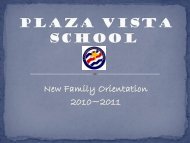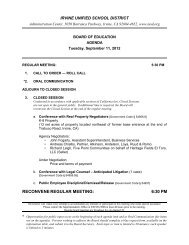reconvene regular meeting: 7:00 pm - Irvine Unified School District
reconvene regular meeting: 7:00 pm - Irvine Unified School District
reconvene regular meeting: 7:00 pm - Irvine Unified School District
Create successful ePaper yourself
Turn your PDF publications into a flip-book with our unique Google optimized e-Paper software.
State can control its cash resources with more certainty and avoid issuance of IOUs, as occurred in July<br />
2<strong>00</strong>9. ABx8 14 will provide the State with authority to impose cash payment deferrals on, among others,<br />
K-12 school districts, community college districts, county offices of education, the California State<br />
University system, the University of California, cities and counties. In accordance with ABx8 14, the State<br />
Department of Finance notified K-12 districts that it would defer the apportionments for July 2010,<br />
October 2010 and March 2011 by up to 60 days, 90 days and 30 days, respectively. The aggregate amount<br />
of such deferrals may not exceed $2.5 billion at any given time. ABx8 14 will not change the ongoing<br />
cross-fiscal year cash deferrals to school districts in the State as described above.<br />
Changes in State Budget; Future State Budgets. No prediction can be made by the Participants<br />
regarding the future budgets, as implemented by the adoption of appropriation bills, its effect on the<br />
Participants or the actions taken in the future by the State Legislature and the Governor to deal with<br />
changing State revenues and expenditures.<br />
No prediction can be made by the Participants as to whether the State will encounter further<br />
budgetary problems in this or in any future fiscal years, and if it were to do so, it is not clear what measures<br />
would be taken by the State to balance its budget, as required by law. In addition, the Participants cannot<br />
predict the final outcome of future State budget negotiations, the impact that such budgets will have on its<br />
finances and operations or what actions will be taken in the future by the State Legislature and Governor to<br />
deal with changing State revenues and expenditures. Current and future State budgets will be affected by<br />
national and State economic conditions and other factors over which the Participants have no control.<br />
Budgets of Participants<br />
The fiscal year for all California school districts begins on the first day of July of each year and<br />
ends on the thirtieth day of June of the following year. On or before July 1 of each year, the governing<br />
board of each school district, including the Participants, is required to file an adopted budget with the<br />
County Superintendent of <strong>School</strong>s. On or before August 15, the County Superintendent of <strong>School</strong>s is<br />
required to examine and approve or disapprove the adopted budgets. If disapproved, then on or before<br />
September 8 such school districts and the County Superintendent of <strong>School</strong>s must make certain revisions<br />
to the budgets, adopt the revised budgets and file the revised budgets with the County Superintendent of<br />
<strong>School</strong>s.<br />
In the event the revised budget of a school district is disapproved, the County Superintendent of<br />
<strong>School</strong>s is empowered by law to oversee the management of such school district for that fiscal year, with<br />
the authority to monitor and review the operation of such district, to develop and adopt a fiscal plan and<br />
budget for such district and to stay and rescind actions that are inconsistent with that budget.<br />
The governing board of each school district must certify to the County Department of Education,<br />
and the county superintendent must certify to the County Board of Education and the State, whether or not<br />
such school district is able to meet its financial obligations for the remainder of the fiscal year and, based<br />
on current forecasts, for the subsequent fiscal year. The certifications shall be classified as positive,<br />
qualified or negative. A positive certification is to be assigned to any school district that is projected to<br />
meet its financial obligations for the current fiscal year and subsequent two fiscal years, a qualified<br />
certification is to be assigned to any school district that is not projected to meet its financial obligations for<br />
the current fiscal year or subsequent two fiscal years and a negative certification is to be assigned to any<br />
school district that likely will be unable to meet its financial obligations subject to certain qualifications for<br />
the remainder of the fiscal year or the subsequent fiscal year. If a county office of education receives a<br />
positive certification when it determines a negative or qualified certification should have been filed with<br />
27<br />
Page 182<br />
22314.4 033985 POS


